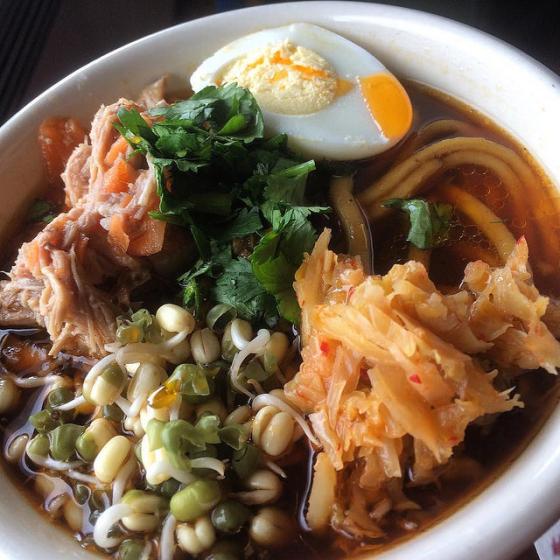Posted February 12, 2016 at 07:57am by Christian Feuerstein
Sterling College Claims #1 for Real Food on Campus for Second Year in a Row

February 12, 2016 • Craftsbury Common, VT • For the second consecutive year , Sterling College has been confirmed as the top college in the United States that serves food on campus that is local, sustainable, humane, and fair-trade.
This ranking comes from the Real Food Challenge, which surveyed over 200 colleges and universities throughout the United States. After reviewing all of the food used in the Sterling College kitchen from July 2014 to June 2015, the college found that 75% of its food met the real food qualification for production methods. Last year, Sterling College was at 74% real food. In comparison, the next-highest ranked institution only eats 66% real food.
“This is a significant achievement, and it demonstrates that Sterling College is on the cutting edge of environmental stewardship,” said President Matthew Derr. “We’ve built upon last year’s success, just as we’ve built upon having one of the first sustainable agriculture programs in the country. Our students are tackling how to redesign the nation’s food system into one that is just, fair, and doesn’t exacerbate climate change.”
Students are gratified, but not surprised by the findings. Sterling College students work on the on-campus farm and the kitchen and have a significant say in what food is served on campus. “Sterling’s food is both delicious and revolutionary,” said Natalie Bekkouche ’16. “There are no vending machines on campus. We grow about 20% of our own food on campus. We look at the entire food cycle here, from seed to compost.” Bekkouche is the Food System Analyst for the 2015-16 school year for her Work Program job and is a Sustainable Food Systems major.
The survey also revealed that Sterling College eats 37% local food, meaning food that comes from either large farms from within a 150-mile radius of campus, or small farms within a 250-mile radius.
Nicole Civita, faculty member in Sustainable Food Systems and the Assistant Director for the Rian Fried Center for Sustainable Agriculture & Food Systems, finds this especially significant. “We use our campus as a living laboratory to grow and prepare our own food, but we also work in a close and interdependent way with the farmers and artisan food producers of the region,” she said. “We wouldn’t be able to reach this percentage of eating real food without sourcing from our local foodshed.”
Simeon Bittman, the Executive Chef for Sterling College, is especially proud of the inclusiveness of the campus kitchen. “The Sterling Kitchen is committed to using our abundance of real food to produce delicious meals that satisfy the diverse dietary needs of our campus community — omnivore, vegetarian, vegan, and gluten-free. Our ethic of food stewardship is paired with a commitment to serving wholesome, flavorful meals. We’re excited to maintain this balance and are developing strategies to improve our numbers even more for next year!”
Sterling College’s Rian Fried Center for Sustainable Agriculture & Food Systems has over 130 acres of farm and garden. Students grow crops, manage livestock, and use both tractors and draft horses to power the farm. The Center also includes an edible forest garden, the Alfond Draft Horse Barn, hoop houses, and a sugar house and sugarbush for maple syrup production.
Sterling College’s kitchen is at the center of the community’s life; all students must complete at least one week of dish chores per semester, student cooks work alongside the professional chefs, and Sterling does not use a food service company to put out meals for all of the students, faculty, and staff.
The Real Food Challenge is an annual challenge for colleges and universities to have 20% real food on campus by 2020. Its goal is to shift $1 billion in institutional food spending to real food.
This announcement comes just after College’s launch of the School of the New American Farmstead, a new program offering a variety of classes and workshops for aspiring agrarians, artisan food enthusiasts, and environmental stewards. These hands-on short courses in small-scale food production, sustainable farming, and food writing offer one-on-one mentorship, inspiration, skills, and new perspectives that will feed the body, the mind, and the spirit. For a full list of courses and to register, visit: www.sterlingcollege.edu/snaf.
--##--
ABOUT STERLING COLLEGE
Founded in 1958 in Craftsbury Common, Vermont, Sterling College is the leading voice in higher education for environmental stewardship. The College was among the first colleges in the United States to focus on sustainability through academic majors in Ecology, Environmental Humanities, Sustainable Agriculture & Food Systems, and Outdoor Education. Sterling College is accredited by the New England Association of Schools and Colleges and is one of only seven federally recognized Work Colleges in the nation.
